

The Definitive Post On Why SOPA And Protect IP Are Bad, Bad Ideas. There's been plenty of talk (and a ton of posts here on Techdirt) discussing both SOPA (originally E-PARASITE) and PROTECT IP (aka PIPA), but it seemed like it would be useful to create a single, "definitive" post to highlight why both of these bills are extremely problematic and won't do much (if anything) to deal with the issues they're supposed to deal with, but will have massive unintended consequences.
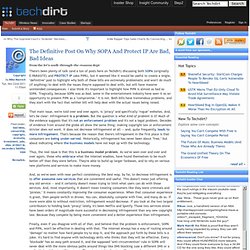
I also think it's important to highlight how PIPA is almost as bad as SOPA. Tragically, because SOPA was so bad, some in the entertainment industry have seen it as an opportunity to present PIPA as a "compromise. " It is not. Both bills have tremendous problems, and they start with the fact that neither bill will help deal with the actual issues being raised.
That main issue, we're told over and over again, is "piracy" and specifically "rogue" websites. SOPA explained: What it is and why it matters - Jan. 17. SOPA's backers say the sweeping anti-piracy bill is needed to squash sites like The Pirate Bay (left), but the tech industry says the bill is rife with unintended consequences.
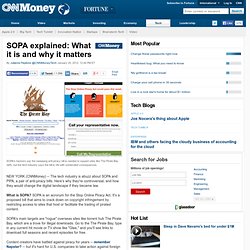
NEW YORK (CNNMoney) -- The tech industry is abuzz about SOPA and PIPA, a pair of anti-piracy bills. Here's why they're controversial, and how they would change the digital landscape if they became law. What is SOPA? SOPA is an acronym for the Stop Online Piracy Act. It's a proposed bill that aims to crack down on copyright infringement by restricting access to sites that host or facilitate the trading of pirated content. Anti-Counterfeiting Trade Agreement (ACTA) ACTA Signing Participants in Tokyo, Japan on October 1, 2011 On October 1, 2011, eight ACTA negotiating partners signed what will become the highest-standard plurilateral agreement ever achieved concerning the enforcement of intellectual property rights.
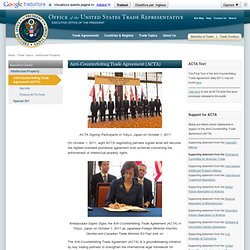
Ambassador Sapiro Signs the Anti-Counterfeiting Trade Agreement (ACTA) in Tokyo, Japan on October 1, 2011 as Japanese Foreign Minister Koichiro Gemba and Canadian Trade Minister Ed Fast look on. The Anti-Counterfeiting Trade Agreement (ACTA) is a groundbreaking initiative by key trading partners to strengthen the international legal framework for effectively combating global proliferation of commercial-scale counterfeiting and piracy. In addition to calling for strong legal frameworks, the agreement also includes innovative provisions to deepen international cooperation and to promote strong intellectual property rights (IPR) enforcement practices. Process. European Parliament rejects ACTA. "I am very pleased that Parliament has followed my recommendation to reject ACTA" said rapporteur David Martin (S&D, UK), after the vote, reiterating his concerns that the treaty is too vague, open to misinterpretation and could therefore jeopardise citizens' liberties.
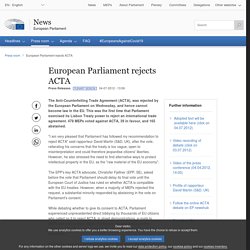
However, he also stressed the need to find alternative ways to protect intellectual property in the EU, as the "raw material of the EU economy". The EPP's key ACTA advocate, Christofer Fjellner (EPP, SE), asked before the vote that Parliament should delay its final vote until the European Court of Justice has ruled on whether ACTA is compatible with the EU treaties. However, when a majority of MEPs rejected this request, a substantial minority responded by abstaining in the vote on Parliament's consent. Procedure: Consent. Www.gpo.gov/fdsys/pkg/BILLS-112s968rs/pdf/BILLS-112s968rs. Www.gpo.gov/fdsys/pkg/BILLS-112hr3261ih/pdf/BILLS-112hr3261ih. Sopa support drops off as blackout protest rattles the internet. Political support for controversial online anti-piracy legislation began crumbling on Wednesday as leading websites staged an unprecedented one-day protest against the measures.
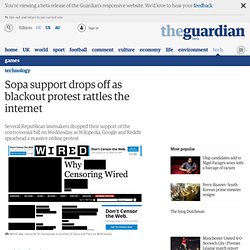
Wikipedia, the sixth most-visited website on the planet, pulled its English site offline Wednesday in protest of the Stop Online Piracy Act (Sopa), which is currently pasing though the House of Representatives, and the Protect IP Act (Pipa), a similar bill under debate in the Senate. Other tech giants, including popular news sharing site Reddit, also pulled the plug while Google censored its name. The protest gained fresh momentum Wednesday when senator Marco Rubio of Florida withdrew his support for Pipa. Rubio is a rising Republican star who is seen as a possible vice president pick this year and a future presidential candidate. Other lawmakers followed suit in rapid succession. Senator Bob Corker of Tennessee came out against the legislation as it stands. "Let this be the beginning," Ohanian added.
List of organizations with official stances on the SOPA and PIPA. Guess Who’s Back? SOPA And ACTA Are Sneaking Into Law Behind Your Back. The Internet has won the fight.

SOPA and ACTA are both dead after having been eviscerated by the combined powers of the world coming together to fight for what they believe in – basic digital human rights. We can now rest easy knowing that the war has come to an end. Politicians would never think to bring them back, even under the guise of innocuous trade agreements and IP bills, right? Orphaned in US, SOPA Finds Home in Russia. The lower house of Russia’s parliament, the Duma, approved [ru] a first draft of the legislation today, June 14, 2013, with a vote of 257 to 3 (plus one abstention).
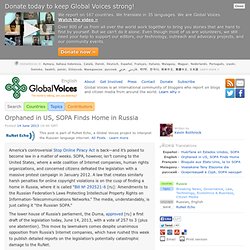
This move by lawmakers comes despite unanimous opposition from Russia’s Internet companies, which have rushed this week to publish detailed reports on the legislation’s potentially catastrophic damage to the RuNet. This image was created by Kevin Rothrock using Vladimir Putin's official portrait by the Russian Presidential Press and Information Office, 2006, CC 3.0. Russian SOPA’s nuts and bolts Indeed, Russia’s SOPA-clone contains a number of worrying clauses. What Are SOPA and PIPA And Why All The Fuss? ACTA und SOPA: Schrotflintenpolitik der Film- und Musikindustrie - Copyrights. Dagobert Duck hatte es noch einfach.
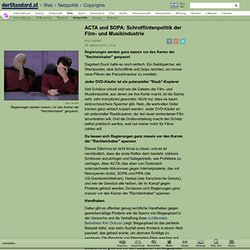
Ein Geldspeicher, ein Wachposten, eine Schrotflinte und Grips reichten, um immer neue Plänen der Panzerknacker zu vereiteln. Jeder DVD-Käufer ist ein potenzieller "Raub"-Kopierer Seit Schätze virtuell sind wie die Dateien der Film- und Musikindustrie, aus denen sie ihre Kohle macht, ist die Sache sehr, sehr kompliziert geworden. Nicht nur, dass es kaum einbruchssichere Speicher gibt. Nein, die wertvollen Güter können ganz einfach kopiert werden: Jeder DVD-Käufer ist ein potenzieller Raubkopierer, der den teuer erstandenen Film amortisieren will.